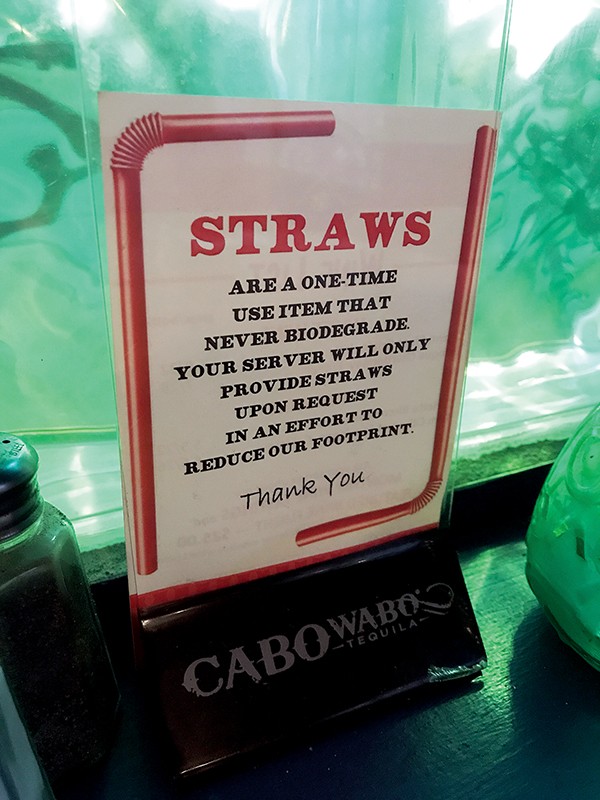Bruce VanWyngarden has gone fishing this week. His column returns when he does.
A few years ago, I was having lunch with a coworker who proceeded to go on a long and sort of crazy rant about how much she hates it when restaurants bundle their straws with silverware. After that, when someone complained bitterly about something of no consequence, “straws” became a sort of shorthand dismissal.
So where do we stand, Memphis, on plastic straws? Is this as an issue “straws”?
 Bianca Phillips
Bianca Phillips
As a single-use plastic, plastic straws are pretty bad. Millions and millions of plastic straws are used each day in America and then tossed out to litter our lands and shores. Some cities, like Malibu and Washington, D.C., have already banned them. In New York and Hawaii, legislation is pending.
In Memphis, we’re seeing more and more restaurants abandoning the plastic straw.
Janet Boscarino, executive director of Clean Memphis, which oversees Project Green Fork, estimates that about half of Project Green Fork members (about 40 restaurants) have given up plastic straws. But, as of now, Project Green Fork does not include anything about straws in their “6 Steps to Certification” for local restaurants.
“We certainly push for the elimination of single-use plastics, which straws would fall into that category,” Boscarino says.
For Earth Day, Project Green Fork did a program they called “Don’t Suck,” which highlighted recyclable options for straws, including paper and bamboo. “We are certainly trying to raise awareness around eliminating [straws],” she says.
For Boscarino, straws are just once piece of the puzzle in reducing food waste — from bags to food containers to the food itself.
Deni Reilly, owner of Majestic Grille with her husband Patrick, says that restaurant has been straws-by-request since it opened 14 years ago. They only began to use coated paper straws about two years ago. (They go through 12,000 to 14,000 straws in a month.)
Reilly says they’ve always leaned toward being environmentally conscious. They don’t provide water, except for large parties. Their to-go glasses are biodegradable.
She says with a laugh that they do it for the sea turtles.
Octavia Young, the owner of Midtown Crossing Grill, began backing away from straws in 2016 about a year after she opened. She says she was thinking about joining Project Green Fork and started looking at what she could do. She then put up a sign: “Straws are a one-time use item that never biodegrade. Your server will only provide straws upon request in an effort to reduce our footprint. Thank you.”
Young says reaction was mixed, but ultimately, no one can argue, because as the sign says, if they want a straw, all they have to do is ask.
“Hearing about how much [waste] a restaurant produces and actually looking at it for myself, I wanted to be a better neighbor in the community that we serve,” she says.
Scott Tashie has been thinking about straws a lot lately. Tashie is owner of City Silo and three area I Love Juice Bars.
“It’s something we’ve been trying to come up with a solution on for a while, actually,” he says. “And it’s super challenging. Obviously, when you’re in a beverage-heavy business, you want to always take care of your customers, and we’ve tried different options. It’s been challenging to find something that actually works.”
At one point, Tashie was using glass straws, but then his source stopped making them. He tried a bring-your-own straw approach, too. He admits that a straw is not something that’s particularly easy to carry on you, like a reusable bag.
Tashie has been experimenting with different types of straws. Forgoing them completely won’t work because of the smoothies he sells. He recently settled on corn straws that he hooked up with through his association with Malco. (He has family ties to the movie theater chain). Malco is currently working to get corn straws at all of its theaters.
Tashie doesn’t mind the extra cost of the straws. For him, it’s worth it. “There’s only one Earth,” he says. “You can’t really put a price on it.”